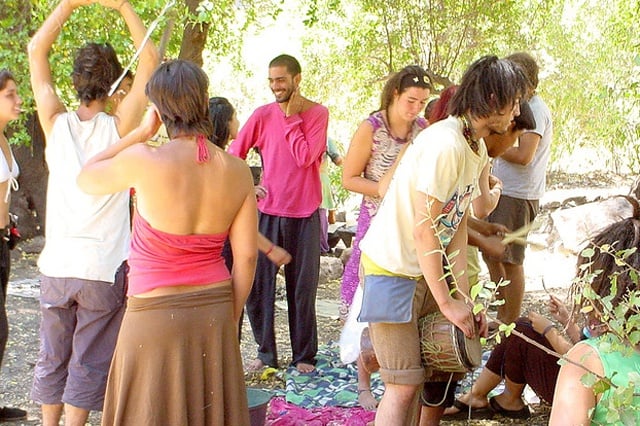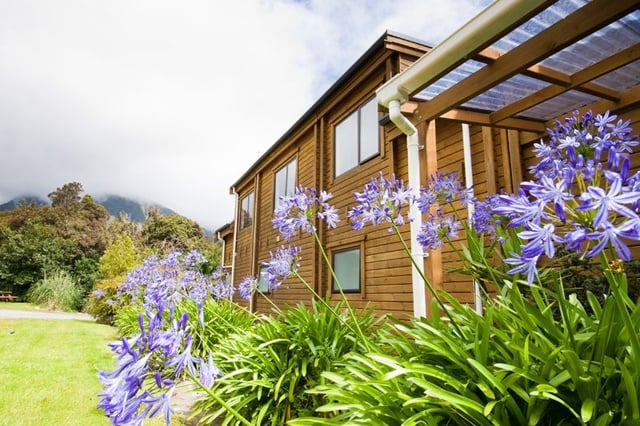1. Ashrams, Temples & Communes
Hindu ashrams are known for offering a serene contemplative life while also engaging in healthy, active community work. You often don’t need any money to participate, assuming you can help out with chores, are an asset to the community and get along well with others. If you have a small donation to give at the beginning of your stay, your contribution will help offset community costs and help solidify a place for yourself in the community. Buddhist temples offer a similar lifestyle, as do some Sufi retreats. Modern Christian monasteries often allow one to live in total silence, which can be really nice if you’re dropping out to ‘get away from it all,’ including talking to people. If there is a local mystical Christian congregation in your area, they may have connections to continually operating monasteries that offer spots to folks on retreat. Life can be nice at spiritual communes, involving daily practice, working in the garden and kitchen, and countless spiritual and self-help conversations with others.
2. The Rainbow Family
The Rainbow Family is a loose association of hippie tribes with their roots in the 1960s and ’70s. Many people of all ages have kept up the ideal hippie lifestyle by traveling from place to place, forming regional gatherings, and living outside mainstream society. Some of these tribes have permanent camps or are based in certain towns, while others are purely nomadic. Bartering is the primary means of obtaining necessary goods. One quickly learns how to camp, live outdoors, go a while without a shower, and be in the moment. There are lots of adventures to be had on the hippie trail, from listening to old stories about the counterculture, to singing great songs by the fire, to escaping bad weather and storms with minimal gear and shelter. If cleanliness is your thing, you may tire of this very outdoor lifestyle. But it you love the great outdoors and can imagine yourself dancing naked around a large campfire with 100 drums beating around you, then this may be a great way to live for a while. These folks travel to and camp in some of the prettiest country in the U.S. It’s hard to argue in favor of rent payments back home when your camp for two weeks has a view of the Tetons and overlooks a waterfall. You can visit a regional gathering or the big national gathering to get a taste, but I suggest you connect with the tribe closest to you and get to know some of the individuals involved. That way you’ll feel more at home and can camp with your peeps at the next gathering. If you get serious about the lifestyle, you’ll bump into many opportunities to join a wandering tribe.
3. Retreat Centers
There are many educational retreat centers in the U.S. and abroad where the public can go for a week or a weekend to take self-help classes, learn to meditate, do art, dance, etc. While these are commercial operations that offer programs, there are typically opportunities to live on site if you join the staff. Positions may be paid, or volunteer in exchange for food and shelter. The work can vary from being on the cleaning staff, to helping with the grounds, to helping produce and set up for events. Some of these positions are seasonal. This is one of the nicest ways to drop out and do something different for a while, since you meet exceptional people (other staff, visiting teachers, and the visiting public), learn lots of new things, and the food is usually good. Who knows, it might even stimulate your next career!
4. Organic Farms
Ready to work? Organic, sustainable farms across the world are often in need of skilled and unskilled physical labor, particularly during the growing and harvest seasons. If you have some farming or gardening skills, you’ll have a better shot at landing a position with a farm. If the farm is big enough, they may be happy to take on anyone willing to work hard, long hours, and learn quickly. In my experience, living on a farm is not a leisurely way to get out of your typical routine. Getting up early is the norm, as is the physical labor. But you learn the important skill of growing food naturally, you engage in a healthy activity that builds strength and stamina, and typically eat very healthily. You’ll meet great people as well. The farm circuit is full of intelligent, caring folks who like to work, have strong bodies and smile broadly as they greet the day. Working on the farm should be enough to offset any rent and food costs, and if you contribute enough you might even gain a paid position.
5. Yoga Centers
Yoga centers are places where the public goes to do yoga retreats and where yoga teachers go for extended periods of training. They typically have a nice, balanced lifestyle with a mix of physical activity and downtime. Wonderful people are coming through on a regular basis and you have a chance to meet many sweet souls. There is usually a significant cost to living at a place like this, unless you have a skill they need (see #6). But if you have the dough, it’s a great lifestyle, especially if you’re into yoga. You’ll deepen your practice, eat well, and live in community with others.
6. The Wandering [Skilled Trade]
There are skills that can take you places, making you an instant asset to many communities and organizations. If you enjoy what you do, it may be a pleasure to do it in a variety of settings, traveling and meeting new people along the way. Carpentry is skill that is in high demand everywhere a new center or building is being built. If you can prove your bona fides to the foreman, you will often be allowed to live on site and be fed in exchange for helping the crew. If you are a great massage therapist, there are many places you can set up shop in exchange for free room and board. Think retreat centers, communities, and spas (where they may even pay you some in addition). Are you a talented web designer? Many organizations need a better web presence, or better online marketing. Tech skills that would normally cost a community a fair amount of money can be bartered for a nice stay at a new location. As people get to know and trust you, you may develop more options to earn income on the side from your new place of retreat.
7. Co-ops
Co-ops are groups of people who combine resources to share needed goods and services, such as food, shelter, health care, etc. There may be several in your local area. Cooperative housing provides a community feel while still allowing you to live in a town or urban area (maybe even the same town you’re already in!). Co-ops share chores such as cleaning and shopping, and often rotate meal duties, so you might have one night of the week to cook with a partner. Meals are often eaten together, although co-op members typically have more diverse individual schedules and activities as compared to living in a commune, and members are always free to do their own thing. Co-ops are a great way to reduce costs and live with a sense of community. Some co-ops have a focused sense of purpose as well, such as to recycle, or a charitable cause, which can make life more invigorating. You can create a different spin on life without changing the town or city you live in by joining a co-op!
8. Intentional Communities
The mother of all alternative lifestyles! There is a community out there for everyone, just choose your interest. Some are stranger than others, and in some you may need to be on guard for funny behavior, but joining an intentional community can change your life quickly. Communities may be focused on permaculture, religion, nudity, living off the grid, survival skills, polyamory, extra-terrestrials, and many variations of counterculture beliefs. Caveat emptor! Go at your own risk, but have a blast!
9. Native Villages
Native villages offer the ultimate in a change of pace and cultural experience. If you are accepted, you can live as many did centuries ago. Chop wood, carry water. Grind corn flour, build a fire. Have slow conversations, watch the sky, and the weather. People in these villages live on a different timeline than the rest of us. Probably a healthier one. Not to lump Indigenous peoples all together, but in my experience, there is more thinking before speaking in villages than in modern society. More listening than answering. And some responses come non-verbally, even through silence. Fishing, hunting, and cooking take up much of the day. As does sharing time with others, learning, telling stories, playing with children. It may seem at times there is nothing else to do on this planet but eat, tell stories and play. Ahhh, what a nice reminder. You may even learn a language and some neat tips about life while you’re there.
10. Foreign Countries
Of course there’s always the big move. As they say, wherever you go, there you are. Why not be in Buenos Aires? Foreign destinations can offer inexpensive living with a very different lifestyle than what you’re used to. Malaysia, Indonesia, Berlin, Central America, and spots in Mexico and South America are popular. In some locales you’ll find an active ex-pat community if you want to be around those with a similar background and language to yourself. In others, you may need to blend in more with local culture. The idea here is to stretch your money as far as it will go while truly enjoying life. Want to live near a tropical beach? Own your own ranch? Not be burdened by a mortgage? If you can afford a plane ticket and can bring some savings with you, you might afford yourself several years in a wonderfully different culture. These ten ways of living offer those seeking change many options to experience life outside the mainstream. They can be great respites for a while, or become a permanent lifestyle. Always know that you have options in how you live. You don’t have to feel stuck by the parameters of modern society. You can choose a life that helps you be happy, have less stress, and fits with what you value and enjoy. Go out there and have an adventure! Featured photo credit: 123RF via 123rf.com









